The Samsung 860 QVO (1TB, 4TB) SSD Review: First Consumer SATA QLC
by Billy Tallis on November 27, 2018 11:20 AM ESTAnandTech Storage Bench - Heavy
Our Heavy storage benchmark is proportionally more write-heavy than The Destroyer, but much shorter overall. The total writes in the Heavy test aren't enough to fill the drive, so performance never drops down to steady state. This test is far more representative of a power user's day to day usage, and is heavily influenced by the drive's peak performance. The Heavy workload test details can be found here. This test is run twice, once on a freshly erased drive and once after filling the drive with sequential writes.
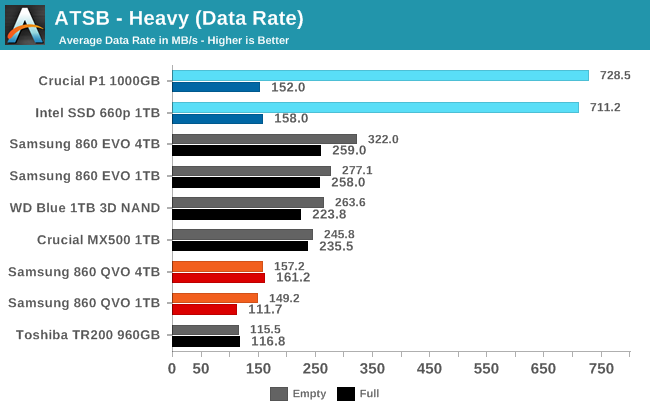
Neither capacity of the Samsung 860 QVO can keep pace with the mainstream TLC drives on the write-intensive Heavy test, but they both outperform the DRAMless TLC drive. The NVMe+QLC drives from Intel and Micron fare much better when the test is run on an empty drive, but when full they too fall behind the mainstream TLC SSDs.
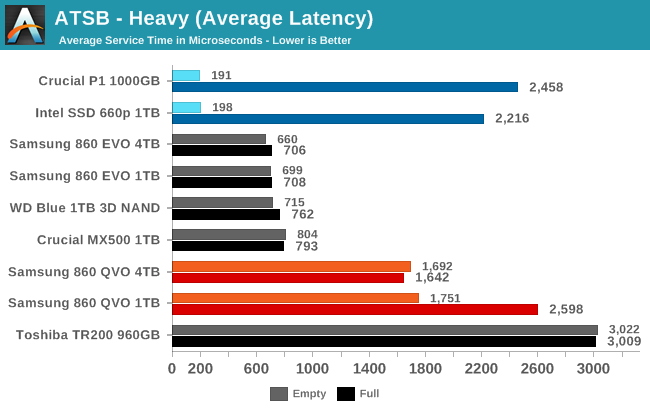
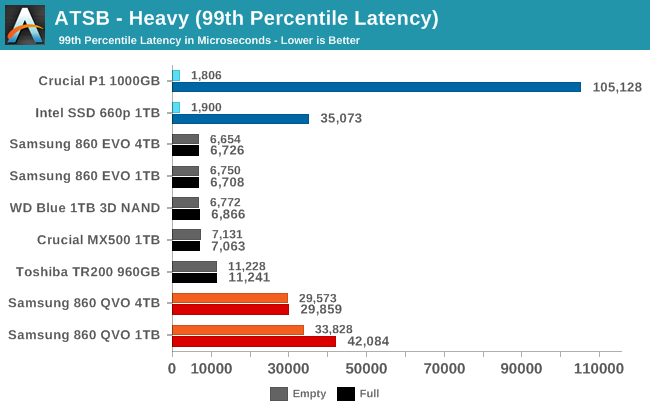
The Samsung 860 QVOs have much worse latency scores than the mainstream TLC drives, and the 99th percentile latency is much worse than even the DRAMless TLC SSD. However, the Samsung QLC drives are a bit better than the Intel/Micron QLC drives at keeping latency under control when the test is run on a full drive.
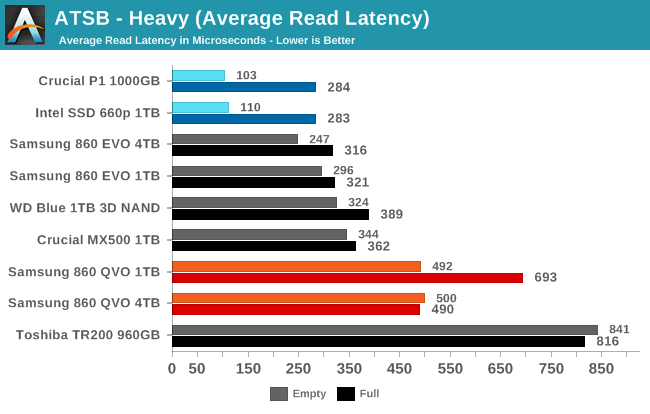
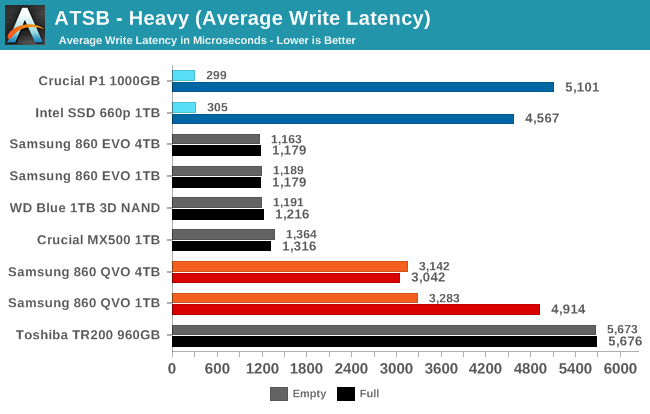
The average read latencies from the Samsung 860 QVOs are only a bit higher than the mainstream TLC drives, but the average write latencies stand out as worse by at least a factor of two.
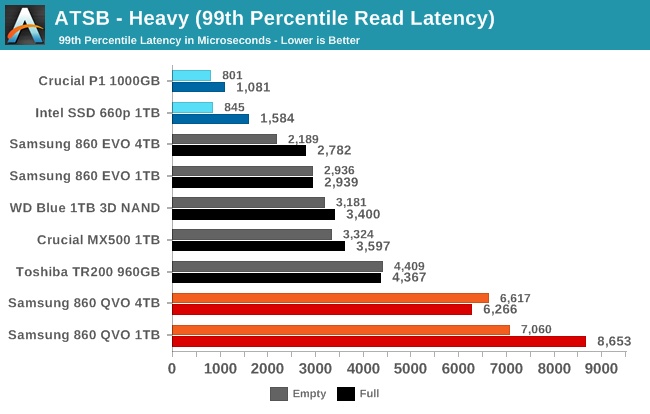
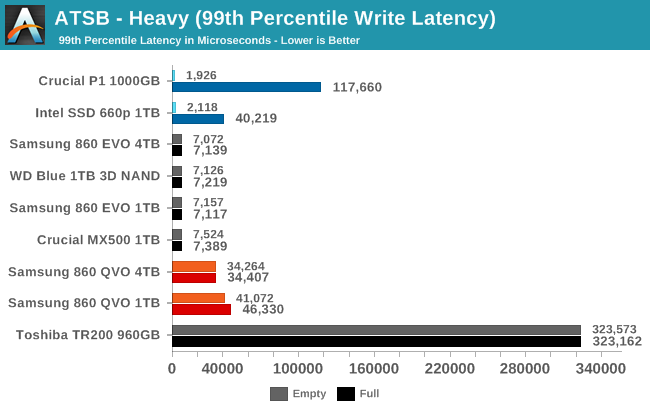
The 99th percentile read and write latency scores from the 860 QVOs are poor, but they at least avoid the horrific write QoS issues that the Toshiba TR200 shows, and are better than the full-drive run on the Crucial P1.
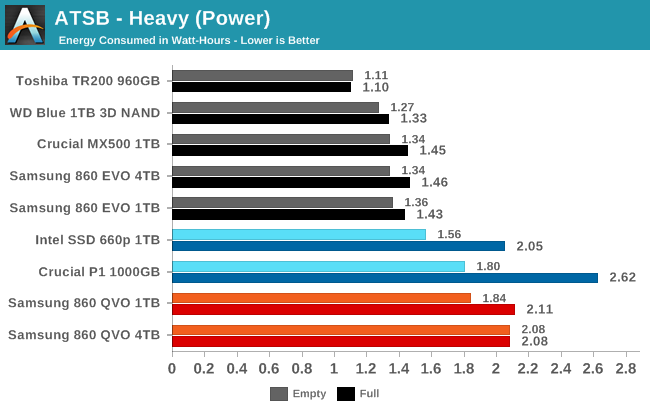
The Samsung 860 QVO uses substantially more energy over the course of the Heavy test than the other SATA drives, and more than the the NVMe QLC drives in most cases, too.










109 Comments
View All Comments
Lolimaster - Thursday, November 29, 2018 - link
SSHD's shoudl use optane, like 32GB.Lolimaster - Thursday, November 29, 2018 - link
And let you manually mirror files that you want accelerated.h0007h - Wednesday, November 28, 2018 - link
It's even slower than HDD。 Why not buy a regular HDD with an Optane? That's much cheaper.piroroadkill - Wednesday, November 28, 2018 - link
It seems to me like the move from TLC to QLC is not just a bit worse, but monumentally so. QLC would have to be a LOT cheaper than TLC to warrant a purchase, not just a bit.piroroadkill - Wednesday, November 28, 2018 - link
"The current street prices for the 860 EVO are lower than the 860 QVO for two out of three capacities, and that's comparing against one of the best SATA SSDs out there."Which makes QLC as a worthless product. I don't think 25% off the cheapest TLC SSDs would be enough, because it seems even worse than that.
rpg1966 - Wednesday, November 28, 2018 - link
Right, because these at-introduction prices will never fall, just like with every other product in the history of the universe.Kamgusta - Wednesday, November 28, 2018 - link
CONCLUSIONS: Current QLC drives are trash.vortmax2 - Wednesday, November 28, 2018 - link
In the end, it's good to see this quad tech coming to the consumers. We're now within striking distance for true HDD to SSD storage/mirror conversion. In the next year or two, pricing will lower enough for many to make the leap.nwarawa - Wednesday, November 28, 2018 - link
YES! Finally! Samsung GETS it! 512GB QLC models should not exist. Even 512GB models with current 3D TLC don't reach the parallelism performance sweet spot. The 2TB model, when priced right, should all but eliminate the case for consumer 2.5in HDDs.Kaihekoa - Wednesday, November 28, 2018 - link
Pretty underwhelming performance and too expensive. I'd buy at 10 centers/GB.